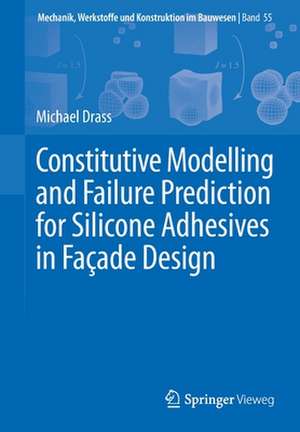Constitutive Modelling and Failure Prediction for Silicone Adhesives in Façade Design: Mechanik, Werkstoffe und Konstruktion im Bauwesen, cartea 55
Autor Michael Drassen Limba Engleză Paperback – 22 feb 2020
Din seria Mechanik, Werkstoffe und Konstruktion im Bauwesen
- 13%
 Preț: 429.63 lei
Preț: 429.63 lei - 15%
 Preț: 537.29 lei
Preț: 537.29 lei -
 Preț: 458.01 lei
Preț: 458.01 lei -
 Preț: 355.31 lei
Preț: 355.31 lei -
 Preț: 422.52 lei
Preț: 422.52 lei -
 Preț: 383.50 lei
Preț: 383.50 lei -
 Preț: 449.15 lei
Preț: 449.15 lei -
 Preț: 484.30 lei
Preț: 484.30 lei -
 Preț: 210.91 lei
Preț: 210.91 lei -
 Preț: 316.91 lei
Preț: 316.91 lei -
 Preț: 315.02 lei
Preț: 315.02 lei -
 Preț: 387.38 lei
Preț: 387.38 lei -
 Preț: 389.49 lei
Preț: 389.49 lei - 15%
 Preț: 639.73 lei
Preț: 639.73 lei -
 Preț: 385.84 lei
Preț: 385.84 lei -
 Preț: 427.11 lei
Preț: 427.11 lei -
 Preț: 277.48 lei
Preț: 277.48 lei -
 Preț: 429.22 lei
Preț: 429.22 lei - 15%
 Preț: 529.32 lei
Preț: 529.32 lei -
 Preț: 454.16 lei
Preț: 454.16 lei -
 Preț: 415.18 lei
Preț: 415.18 lei -
 Preț: 420.58 lei
Preț: 420.58 lei - 18%
 Preț: 786.98 lei
Preț: 786.98 lei - 18%
 Preț: 786.98 lei
Preț: 786.98 lei - 18%
 Preț: 782.87 lei
Preț: 782.87 lei - 18%
 Preț: 778.76 lei
Preț: 778.76 lei - 15%
 Preț: 452.14 lei
Preț: 452.14 lei -
 Preț: 382.18 lei
Preț: 382.18 lei - 15%
 Preț: 522.42 lei
Preț: 522.42 lei
Preț: 699.77 lei
Preț vechi: 823.26 lei
-15% Nou
Puncte Express: 1050
Preț estimativ în valută:
133.92€ • 139.30$ • 110.56£
133.92€ • 139.30$ • 110.56£
Carte tipărită la comandă
Livrare economică 14-28 aprilie
Preluare comenzi: 021 569.72.76
Specificații
ISBN-13: 9783658292546
ISBN-10: 3658292547
Ilustrații: XX, 291 p. 100 illus.
Dimensiuni: 168 x 240 mm
Greutate: 0.5 kg
Ediția:1st ed. 2020
Editura: Springer Fachmedien Wiesbaden
Colecția Springer Vieweg
Seria Mechanik, Werkstoffe und Konstruktion im Bauwesen
Locul publicării:Wiesbaden, Germany
ISBN-10: 3658292547
Ilustrații: XX, 291 p. 100 illus.
Dimensiuni: 168 x 240 mm
Greutate: 0.5 kg
Ediția:1st ed. 2020
Editura: Springer Fachmedien Wiesbaden
Colecția Springer Vieweg
Seria Mechanik, Werkstoffe und Konstruktion im Bauwesen
Locul publicării:Wiesbaden, Germany
Cuprins
Introduction. - Theoretical Principles on Mechanics. - Elastomers and their Mechanical Behaviour. - Experiments on Transparent Structural Silicone Adhesive. - Development of Constitutive Models for Poro-Hyperelastic Materials. - Development of Failure Criteria for Poro-Hyperelastic Materials. - Design Methods for Structural Silicone Adhesives. - Conclusion and Outlook. - Bibliography
Notă biografică
Michael Drass trained as a civil engineer and received his Master’s degree in Structural Engineering from the University of Applied Sciences in Mainz, Germany. He subsequently pursued his Ph.D. studies at the Technical University of Darmstadt’s Institute of Structural Mechanics and Design, where he focused on adhesive joints of all kinds in general glass constructions. This was also the subject of his dissertation on Constitutive Modelling and Failure Prediction of Silicone Adhesives in Façade Design. The author is currently working as a Post-Doc at the Technical University of Darmstadt. His work here is dedicated to identifying areas of application for artificial intelligence (AI) in civil engineering with a special focus on structural glass constructions. This topic is also the focus of the start-up founded by Michael Drass and Michael Kraus, M&M Network-Ing UG, which primarily develops and implements AI applications for companies.
Textul de pe ultima copertă
This book provides readers with an elementary understanding of the material behavior of structural silicones in façades. Based on extensive experimental investigations on a transparent structural silicone adhesive (TSSA), the material behavior, failure, and microscopic effects such as stress whitening, cavitation failure, and the Mullins effect are analyzed. In turn, novel hyperelastic material models are developed to account for nonlinear material behavior under arbitrary deformations. The development of a volumetric hyperelastic model makes it possible for the first time to approximate the structural behavior of TSSA under constrained tensile load and cavitation. The material models discussed here were implemented in a finite element code for validation, and their quality was confirmed by three-dimensional numerical simulations, in which an additional stretch-based failure criterion was evaluated for failure prediction. The numerical studies are in good agreement with the experimental results.
Caracteristici
Provides readers with an elementary understanding of the material behavior of structural silicones in façades Addresses and analyzes the material behavior, failure, and microscopic effects such as stress whitening, cavitation failure, and the Mullins effect Describes novel hyperelastic material models developed by the author
